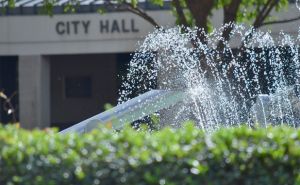A change in water and sewer rates is likely coming to Senoia. A proposed increase of 10 percent for water service and 21 percent for sewer service for residential customers, based on average consumption, is designed to make up the difference in system revenue requirements that have suffered during the recession. The proposal discussed at the Dec. 10 public hearing was continued until the Dec. 17 council meeting.
The City Council considered four proposals for the new water and sewer rates. The most equitable for all customers, proposal 4, would result in an equivalent increase for residential, commercial and industrial users.
The reason for the rate increase deals with the city’s financing agreements that require operating revenues to be 110 percent of expenditures. The sewer system operated in the red last year, largely due to the ongoing effects of the recession, city officials said.
City Administrator Richard Ferry said the proposed rate structure would mean an increase of approximately 10 percent for residential water customers over the current rates, based on an average use of 5,000 gallons per month, and an increase of approximately 21 percent for sewer service.
For residential water customers, the current base rate of up to 1,500 gallons would decrease from the current charge of $14.50 to $13.75 for the first 1,000 gallons. Water rates for residential customers ranging from 1,000-5,000 gallons, with the average customer use being 5,000 gallons, would add $4.40 to the bill compared to the current $4 rate.
The current base rate for residential sewer service of $19 for 1,500 gallons would increase to $20.57 for the first 1,000 gallons. Sewer rates for 1,000-5,000 gallons would increase to $4.84 compared to the current $4 rate.
Rates for commercial and industrial uses would also see a proportionate increase in water and sewer bills for the first 5,000 gallons.
The water and sewer rate changes required only one public hearing for approval, but Mayor Robert Belisle requested, and the council agreed, to continue the hearing until the Dec. 17 meeting to invite additional public feedback on the proposal.












Leave a Comment
You must be logged in to post a comment.